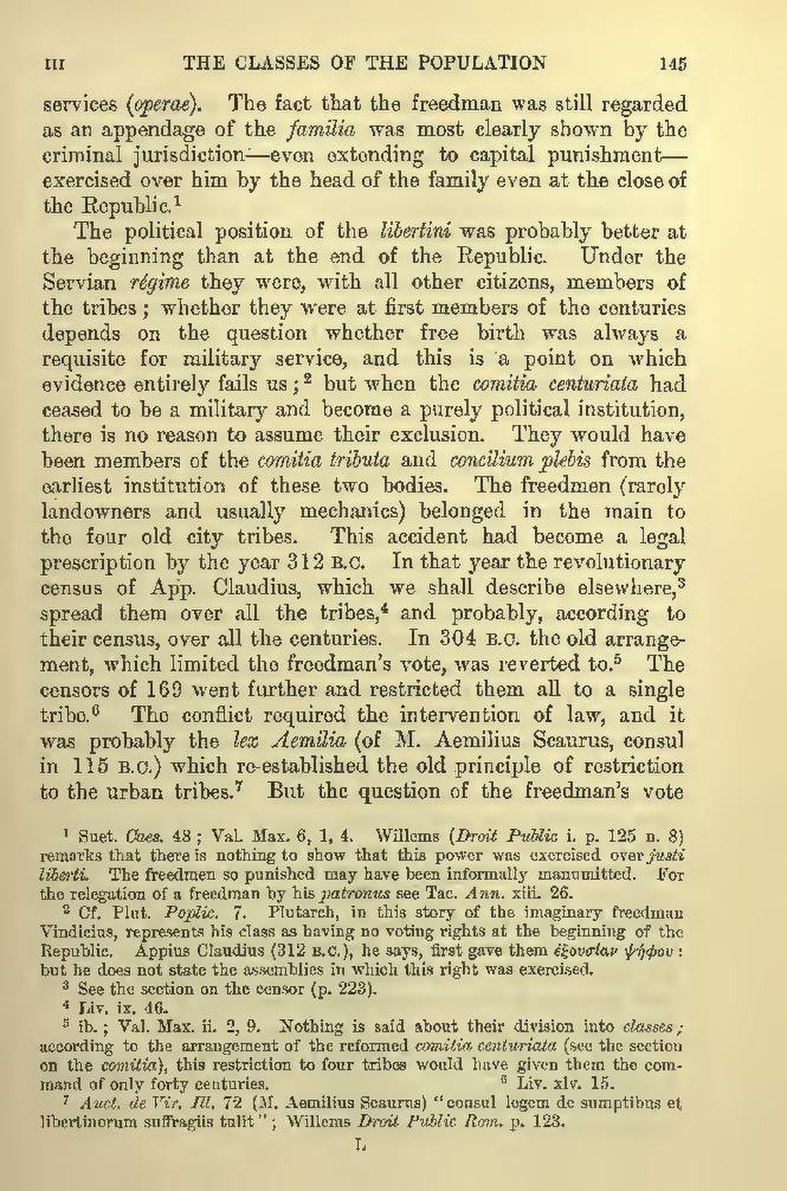services (operae). The fact that the freedman was still regarded as an appendage of the familia was most clearly shown by the criminal jurisdiction—even extending to capital punishment—exercised over him by the head of the family even at the close of the Republic.[1]
The political position of the libertini was probably better at the beginning than at the end of the Republic. Under the Servian régime they were, with all other citizens, members of the tribes; whether they were at first members of the centuries depends on the question whether free birth was always a requisite for military service, and this is a point on which evidence entirely fails us;[2] but when the comitia centuriata had ceased to be a military and become a purely political institution, there is no reason to assume their exclusion. They would have been members of the comitia tributa and concilium plebis from the earliest institution of these two bodies. The freedmen (rarely landowners and usually mechanics) belonged in the main to the four old city tribes. This accident had become a legal prescription by the year 312 B.C. In that year the revolutionary census of App. Claudius, which we shall describe elsewhere,[3] spread them over all the tribes,[4] and probably, according to their census, over all the centuries. In 304 B.C. the old arrangement, which limited the freedman's vote, was reverted to.[5] The censors of 169 went further and restricted them all to a single tribe.[6] The conflict required the intervention of law, and it was probably the lex Aemilia (of M. Aemilius Scaurus, consul in 115 B.C.) which re-established the old principle of restriction to the urban tribes.[7] But the question of the freedman's vote: but he does not state the assemblies in which this right was exercised.]
- ↑ Suet. Caes. 48; Val. Max. 6, 1, 4. Willems (Droit Public i. p. 125 n. 8) remarks that there is nothing to show that this power was exercised over justi liberti. The freedmen so punished may have been informally manumitted. For the relegation of a freedman by his patronus see Tac. Ann. xiii 26.
- ↑ Cf. Plut. Poplic. 7. Plutarch, in this story of the imaginary freedman Vindicius, represents his class as having no voting rights at the beginning of the Republic. Appius Claudius (312 B.C.), he says, first gave them [Greek: exousian psêphou
- ↑ See the section on the censor (p. 223).
- ↑ Liv. ix. 46.
- ↑ ib.; Val. Max. ii. 2, 9. Nothing is said about their division into classes; according to the arrangement of the reformed comitia centuriata (see the section on the comitia), this restriction to four tribes would have given them the command of only forty centuries.
- ↑ Liv. xlv. 15.
- ↑ Auct. de Vir. Ill. 72 (M. Aemilius Scaurus) "consul legem de sumptibus et libertinorum suffragiis tulit"; Willems Droit Public Rom. p. 123.
